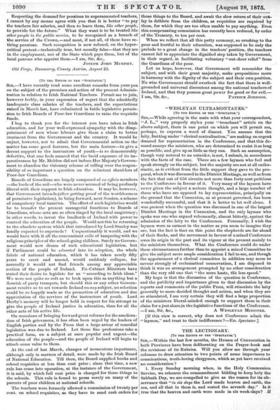[TO THE EDITOR OF THE"SPECTATOR:']
SIR,—I have recently read some excellent remarks from your pen on the subject of the promises and action of the present Adminis- tration in relation to Irish National Teachers. Permit me to join, however feebly, in your expression of regret that the admittedly inadequate class salaries of the teachers, and the expectations raised in March last, have culminated in futile legislative permis- sion to Irish Boards of Poor-law Guardians to raise the requisite funds.
I beg to thank you for the interest you have taken in Irish education, and for your well-expressed sympathy with the disap- pointment of men whose labours give them a claim to better treatment from the Government and the country. It would be unjust, however, not to admit that Governmental action on the matter has some good features, but the main feature—to give a decent support to the instructors of youth—is so demonstrably defective, that one feels amazed that the lucid exposure of its im- perativeness by Mr. Meldon did not induce Her Majesty's Govern- ment to abandon the visionary scheme of rolling over the respon- sibility of so important a question on the reluctant shoulders of Poor-law Guardians.
Boards of Guardians are largely composed of ex-officio members —the lords of the soil—who were never accused of being profusely liberal with their support to Irish education. It may be, however, that Government intends (after getting proof of the worthlessness of permissive legislation), to bring forward, next Session, a scheme of compulsory local taxation. The effect of such legislation would be to transfer the present managerial functions to Boards of Guardians, whose acts are so often tinged by the local magistracy; in other words, to invest the landlords of Ireland with power to control the education of the people. Would not this be returning to the obsolete system which that introduced by Lord Stanley was fondly expected to supersede? Unquestionably it would, and we would have with it all the concomitant evils of tampering with the religious principles of the school-going children. Surely no Govern- ment would now dream of such educational legislation, but if Parliament could be educated into its adoption, the whole fabric of national education, which it has taken nearly fifty years to erect and amend, would suddenly collapse, for assuredly it would not find friends among any appreciable section of the people of Ireland. Ex-Cabinet Ministers have stated their desire to legislate for us " according to Irish ideas." We were not quite so soft as to look upon this as anything but a flourish of party trumpets, but should this or any other Govern- ment resolve so to act towards Ireland on any subject, no selection could be so happily made as the promotion of education and due appreciation of the services of the instructors of youth. Lord Derby's memory will be longer held in respect for his attempt to give the people of Ireland justice in education, than for all the other acts of his active life.
On occasions of bringing forward great reforms for the ameliora- tion of Irish grievances, it has often been urged by the leaders of English parties and by the Press that a large arrear of remedial legislation was due to Ireland. Let those fine professions take a practical form, on a subject at once popular and urgent--the education of the people—and the people of Ireland will begin to attach some value to them.
At the end of last March, changes of momentous importance, although only in matters of detail, were made by the Irish Board of National Education. Till then, the Board supplied books and school requisites at less than cost price ; since that time, a new rule has come into operation, at the instance of the Government, it is said, by which full cost price is charged for those things to the schools. This rule is found to press sorely on many of the parents of poor children at national schools.
The teachers were formerly allowed a commission of twenty per cent. on school requisites, as they have to send cash orders for those things to the Board, and await the slow return of their out- lay in driblets from the children, as requisites are required by them, for which they are too often unable to pay anything. Even this compensating commission has recently been reduced, by order of the Treasury, to ten per cent.
When we reflect that all this petty economy, so crushing to the poor and hurtful to their education, was supposed to be only the prelude to a great change in the teachers' position, the teachers cannot fail to appreciate the dignified step taken by Government, in their regard, in facilitating voluntary "out-door relief" from the Guardians of the poor.
Let us hope, however, that Government will reconsider the subject, and with their great majority, make propositions more in harmony with the dignity of the subject and their own position. No wise Government should overlook the fact that there is well- grounded and universal discontent among the national teachers of Ireland, and that they possess great power for good or for evil.—






























 Previous page
Previous page